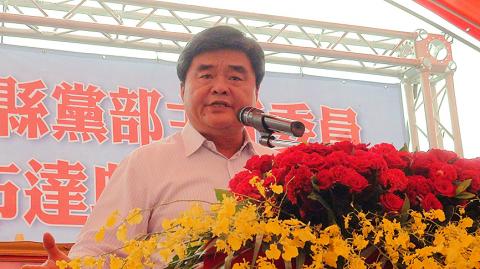The Supreme Court yesterday upheld corruption charges against former Yunlin County commissioner Chang Jung-wei (張榮味) of the Chinese Nationalist Party (KMT).
It sentenced him to eight years in prison and deprived him of civil rights for four years.
Chang, 60, was found guilty of taking NT$30 million (US$983,574) in bribes from a contractor for a government project to build an incinerator while he was Yunlin County commissioner.

Photo: Lin Kuo-hsien, Taipei Times
It was the final ruling, bringing to conclusion a court battle that lasted 14 years.
Chang served two terms as commissioner from 1999 to 2005. He began his political career as Yunlin County council speaker in 1990.
Pundits and social commentators said that Chang’s family had dominated Yunlin politics for the past two decades, and from his base in Yunlin, he controlled many of the transportation, sales and agricultural marketing networks in Taiwan.
His younger sister Chang Li-shan (張麗善) is a KMT legislator representing Yunlin, while his daughter Chang Chia-chun (張嘉郡) served as KMT legislator from 2012 to 2016.
The Chang family is known for its influence in regional farming cooperatives, with Chang Jung-wei’s younger brother Chang Chi-meng (張啟盟) serving as the chairman of the Federation of Taiwan Provincial Agriculture Cooperatives (台灣農業合作社聯合社).
Central Taiwan Farmers Cooperative Association secretary-general Chang Jung-cheng (張永成) is another of Chang’s family members.
The family has in the past controlled the transportation and sales channels of Taipei Agricultural Products Marketing Corp.
The case began in 2004, when the county allocated NT$3.3 billion to build a garbage incinerator in Yunlin’s Linnei Township (林內鄉), with potential contractors Onyx Ta-Ho Co (達和公司) and Ding Shu Co (鼎旭公司) resorting to bribing Yunlin County Government officials to become the contractors for the project.
In yesterday’s ruling, former Linnei township chief Chen Ho-shan (陳河山), was also convicted for taking a NT$16 million bribe from contractors. He was handed the same punishment as Chang.
In the first trial at a district court, Chang Jung-wei was found guilty and handed a 14-year sentence. The court reversed the conviction in a second trial and found him not guilty.
Prosecutors appealed the decision, and the case went to trial a third time, with the Tainan Branch of the Taiwan High Court upholding the earlier conviction and handing Chang Jung-wei a nine-year sentence, which was reduced to eight years in the fourth retrial.
When asked to comment on the ruling, Chang Jung-wei said: “I had thought the justice system would find me innocent, but we see politics has interfered with the case... Now the process is completed, I can do nothing, but face the punishment.”
Secretary-general for Central Taiwan Farmers Cooperative Association Chang Jung-cheng said he could not accept the ruling, as the case had no new evidence and was based on questionable testimonies.
It was the ruling government’s way of derailing the KMT’s election campaign in central Taiwan, Chang Jung-cheng said.

CAUTION: Based on intelligence from the nation’s security agencies, MOFA has cautioned Taiwanese travelers about heightened safety risks in China-friendly countries The Ministry of Foreign Affairs (MOFA) yesterday urged Taiwanese to be aware of their safety when traveling abroad, especially in countries that are friendly to China. China in June last year issued 22 guidelines that allow its courts to try in absentia and sentence to death so-called “diehard” Taiwanese independence activists, even though Chinese courts have no jurisdiction in Taiwan. Late last month, a senior Chinese official gave closed-door instructions to state security units to implement the guidelines in countries friendly to China, a government memo and a senior Taiwan security official said, based on information gathered by Taiwan’s intelligence agency. The

Taiwan Semiconductor Manufacturing Co (TSMC), the world’s largest contract chipmaker, said yesterday that it is looking to hire 8,000 people this year, at a time when the tech giant is expanding production capacity to maintain its lead over competitors. To attract talent, TSMC would launch a large-scale recruitment campaign on campuses across Taiwan, where a newly recruited engineer with a master’s degree could expect to receive an average salary of NT$2.2 million (US$60,912), which is much higher than the 2023 national average of NT$709,000 for those in the same category, according to government statistics. TSMC, which accounted for more than 60 percent

Tung Tzu-hsien (童子賢), a Taiwanese businessman and deputy convener of the nation’s National Climate Change Committee, said yesterday that “electrical power is national power” and nuclear energy is “very important to Taiwan.” Tung made the remarks, suggesting that his views do not align with the country’s current official policy of phasing out nuclear energy, at a forum organized by the Taiwan People’s Party titled “Challenges and Prospects of Taiwan’s AI Industry and Energy Policy.” “Taiwan is currently pursuing industries with high added- value and is developing vigorously, and this all requires electricity,” said the chairman

‘POOP ON STAGE’: The song, which talks about the reluctance to graduate and anxiety about a lack of job opportunities, resonated with many students’ feelings The original song Poop on Stage has been chosen as National Taiwan University’s (NTU) graduation song this year, sparking much debate regarding the song’s title and content, which describes students’ anxiety about post-graduation unemployment. The title, Shang Tai Da Bian (上台大便), is a play on words that literally means “go on stage to poop.” The first three characters, shang tai da (上台大), also mean “to attend NTU,” as “Taida” is a common abbreviation for the university. The last character, bian (便), can mean “convenient” or “then,” but is more commonly associated with defecation. The lyrics of the song describe students’ reluctance to graduate and